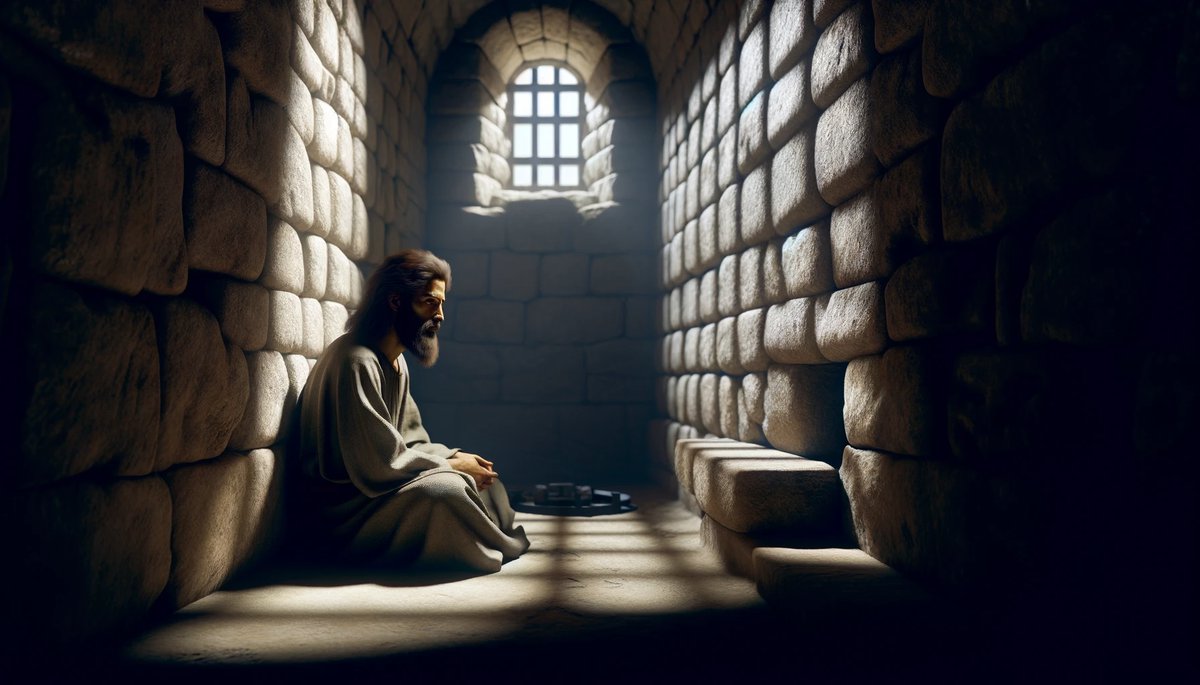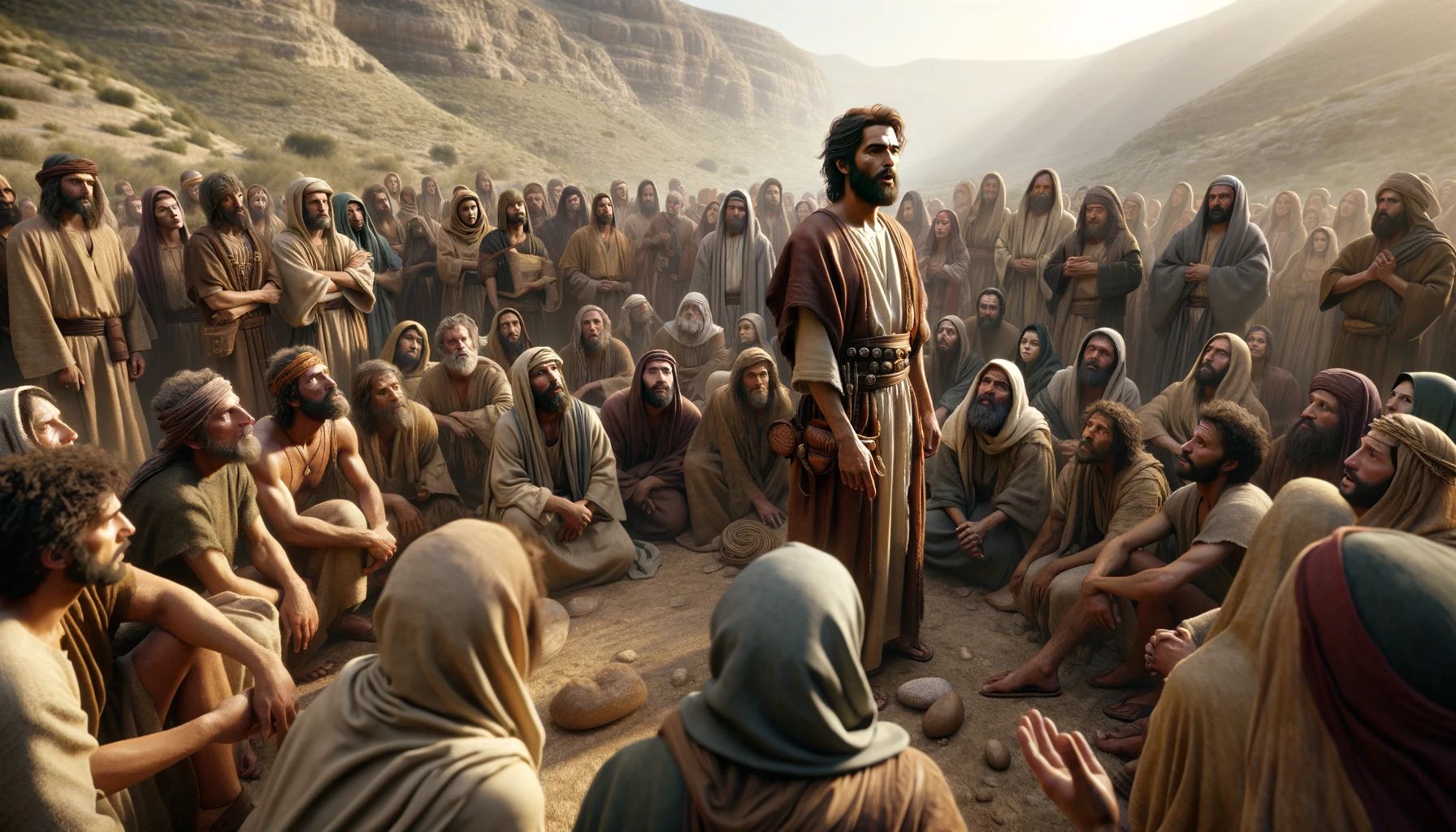Home>Theology and Spirituality>Why Was John The Baptist Imprisoned?


Theology and Spirituality
Why Was John The Baptist Imprisoned?
Published: February 21, 2024
Peter Smith, Editorial Director at Christian.net, combines deep insights into faith, politics, and culture to lead content creation that resonates widely. Awarded for his contributions to religious discourse, he previously headed a major organization for religious communicators, enhancing dialogue on faith's societal impacts.
Discover the reasons behind John the Baptist's imprisonment and explore the theological and spiritual implications of this significant event in biblical history. Unlock the deeper meaning behind this pivotal moment.
(Many of the links in this article redirect to a specific reviewed product. Your purchase of these products through affiliate links helps to generate commission for Christian.net, at no extra cost. Learn more)
Table of Contents
Introduction
The story of John the Baptist, a pivotal figure in Christian theology and spirituality, is one that resonates deeply with believers and scholars alike. His life and ministry, as documented in the New Testament, are marked by unwavering devotion to his calling and a fearless proclamation of repentance and the coming of the Messiah.
John the Baptist's significance transcends mere historical narrative; it embodies profound spiritual and theological implications that continue to inspire and challenge individuals across generations. His unwavering commitment to righteousness and his pivotal role in heralding the arrival of Jesus Christ make his story a compelling subject of study and reflection.
In exploring the circumstances surrounding John the Baptist's imprisonment, we delve into a critical juncture in his life and ministry. This pivotal event not only sheds light on the political and social dynamics of the time but also offers profound insights into the complexities of faith, courage, and the clash between divine truth and human authority.
As we embark on this exploration, we will unravel the sequence of events leading to John the Baptist's imprisonment, examine the key players involved, and seek to understand the deeper spiritual and theological underpinnings of this significant chapter in biblical history. Through this journey, we aim to gain a deeper appreciation for the enduring relevance of John the Baptist's legacy and the timeless truths encapsulated within his story.
Read more: Why Was John The Baptist Named John
John the Baptist's Ministry
John the Baptist's ministry stands as a profound testament to his unwavering commitment to his divine calling and the radical message he proclaimed. His ministry, set against the backdrop of the Judean wilderness, was characterized by a compelling call to repentance and a fervent anticipation of the imminent arrival of the Messiah.
As a pivotal figure in the New Testament narrative, John the Baptist emerged as a voice crying out in the wilderness, echoing the prophetic tradition of heralding the coming of the Lord. Clad in a garment of camel's hair and sustained by a diet of locusts and wild honey, he embodied a stark contrast to the opulence and complacency of the religious establishment of his time.
John's message reverberated with urgency and conviction, as he fearlessly called the people to turn away from their sins and prepare their hearts for the arrival of the long-awaited Messiah. His baptism of repentance symbolized a profound spiritual cleansing and readiness for the transformative work of the coming Christ.
Moreover, John's ministry attracted multitudes from various walks of life, drawing both the common people and even religious leaders to the banks of the Jordan River. His uncompromising proclamation of truth and righteousness resonated deeply with those who longed for spiritual renewal and a genuine encounter with God.
In addition to his powerful preaching, John the Baptist also encountered Jesus Christ, whom he baptized in the Jordan River, marking the commencement of Jesus' public ministry. This pivotal moment not only affirmed John's prophetic role in preparing the way for the Messiah but also underscored the profound spiritual significance of his ministry in the grand narrative of redemption.
Overall, John the Baptist's ministry serves as a compelling example of unwavering faithfulness to his divine calling, a bold proclamation of truth, and a profound anticipation of the redemptive work of the Messiah. His life and ministry continue to inspire believers to embrace a radical commitment to righteousness and a fervent expectation of the transformative power of Christ's coming.
Confrontation with Herod Antipas
The confrontation between John the Baptist and Herod Antipas, the tetrarch of Galilee and Perea, stands as a pivotal episode in the narrative of John's ministry. Herod Antipas, a complex and controversial figure in the political landscape of first-century Judea, held considerable power and influence over the region. His tumultuous personal life and political maneuverings would intersect with the prophetic ministry of John the Baptist in a dramatic and fateful manner.
The catalyst for the confrontation between John the Baptist and Herod Antipas stemmed from the tetrarch's illicit relationship with Herodias, the wife of his brother, Philip. John fearlessly condemned this union as a violation of Jewish law and a blatant disregard for moral righteousness. His outspoken criticism of Herod Antipas's actions underscored the prophet's unwavering commitment to upholding divine truth and moral integrity, regardless of the consequences.
Herod Antipas, however, was not indifferent to John's prophetic denunciations. Despite being perplexed by John's message, he was also wary of the prophet's influence over the people. The tetrarch's ambivalence toward John the Baptist reflected the tension between his political authority and the moral challenges posed by the prophet's uncompromising message.
The confrontation reached a critical juncture when Herod Antipas, swayed by the manipulative schemes of Herodias' daughter, granted her request for the head of John the Baptist. This tragic turn of events culminated in the imprisonment and eventual martyrdom of John, marking a sobering clash between the prophetic call for righteousness and the entanglements of political power.
The confrontation with Herod Antipas serves as a poignant reminder of the inherent tension between divine truth and human authority. John the Baptist's unwavering stance against moral transgression and his fearless rebuke of Herod Antipas's actions exemplify the prophetic call to confront injustice and uphold righteousness, even in the face of formidable opposition.
This pivotal confrontation not only underscores the profound moral implications of John the Baptist's ministry but also highlights the enduring relevance of his prophetic witness in challenging the power structures of every age. The clash between John and Herod Antipas reverberates with timeless significance, compelling individuals to grapple with the complexities of moral courage, political accountability, and the unwavering pursuit of divine truth.
Imprisonment of John the Baptist
The imprisonment of John the Baptist stands as a harrowing and pivotal chapter in the narrative of his prophetic ministry. Following his fearless confrontation with Herod Antipas over the tetrarch's illicit relationship with Herodias, the wife of his brother, Philip, John found himself ensnared in the web of political intrigue and moral defiance.
Herod Antipas, torn between his perplexity over John's message and his concern over the prophet's influence, succumbed to the manipulative machinations of Herodias' daughter. This led to the fateful decision to imprison John the Baptist, silencing the prophetic voice that had resounded with uncompromising calls for repentance and moral righteousness.
The circumstances of John's imprisonment reflect the collision of divine truth and human frailty, as the prophet's unwavering commitment to upholding moral integrity clashed with the political expediency and moral compromise of the ruling authorities. The stark contrast between John's prophetic witness and the entanglements of power and privilege underscores the profound tensions inherent in the collision of spiritual conviction and temporal authority.
As John languished in prison, his confinement symbolized the cost of speaking truth to power and the sobering reality of standing against moral transgression in a world rife with political intrigue and moral compromise. Yet, even in the darkness of his imprisonment, John's unwavering faith and steadfast commitment to his divine calling continued to inspire and challenge those who heard of his plight.
The imprisonment of John the Baptist serves as a poignant reminder of the inherent risks and sacrifices entailed in bearing witness to divine truth in a world fraught with moral ambiguity and political expediency. His confinement stands as a testament to the enduring relevance of his prophetic legacy, compelling individuals to confront the complexities of moral courage, political accountability, and the unwavering pursuit of righteousness.
In the shadow of his imprisonment, John the Baptist's unwavering faith and resolute commitment to his prophetic calling continue to echo across the annals of history, inspiring generations to embrace a radical devotion to truth and righteousness, regardless of the personal cost.
Reasons for John the Baptist's Imprisonment
John the Baptist's imprisonment was not merely a result of political expediency or personal vendetta; rather, it stemmed from a complex interplay of religious, moral, and political factors that converged to silence the prophetic voice that had resounded with uncompromising clarity.
-
Moral Confrontation with Herod Antipas: John the Baptist's unyielding condemnation of Herod Antipas' illicit relationship with Herodias, the wife of his brother, Philip, struck at the heart of moral integrity and righteousness. His fearless denunciation of this union challenged the ethical fabric of the ruling authority, posing a direct threat to the status quo and exposing the moral transgressions of those in power.
-
Threat to Political Stability: John's growing influence and the fervent following he commanded posed a potential threat to the political stability and control of Herod Antipas. The prophet's unwavering call for repentance and moral renewal resonated deeply with the masses, engendering a groundswell of spiritual awakening that could potentially undermine the tetrarch's authority and influence.
-
Clash of Divine Truth and Human Authority: The imprisonment of John the Baptist epitomized the collision between divine truth and human authority. His uncompromising commitment to upholding moral righteousness clashed with the political expediency and moral compromise of the ruling elite, leading to his incarceration as a means of silencing the prophetic challenge he embodied.
-
Symbolic Repression of Prophetic Witness: The imprisonment of John the Baptist served as a symbolic act of repressing the prophetic witness that had reverberated with uncompromising calls for repentance and moral renewal. By silencing the voice of the prophet, Herod Antipas sought to quell the moral and spiritual awakening that John had ignited, thereby preserving the status quo and shielding his own moral transgressions from further scrutiny.
In essence, John the Baptist's imprisonment was a culmination of his unwavering commitment to upholding divine truth and moral integrity, which posed a direct challenge to the political and moral complacency of the ruling authorities. His incarceration symbolized the inherent tension between prophetic conviction and temporal authority, underscoring the enduring relevance of his prophetic legacy in confronting the complexities of moral courage, political accountability, and the unwavering pursuit of righteousness.
Conclusion
The imprisonment of John the Baptist stands as a poignant testament to the enduring clash between divine truth and human authority, moral courage and political expediency. His unwavering commitment to upholding moral integrity and righteousness, even in the face of formidable opposition, embodies a timeless call to confront injustice and bear witness to the transformative power of divine truth.
The confrontation with Herod Antipas and the subsequent imprisonment of John the Baptist underscore the profound moral implications of his prophetic ministry. His fearless denunciation of moral transgression and his unwavering call for repentance challenged the status quo, compelling individuals to confront the complexities of moral courage, political accountability, and the unwavering pursuit of righteousness.
Moreover, John's imprisonment serves as a sobering reminder of the inherent risks and sacrifices entailed in bearing witness to divine truth in a world fraught with moral ambiguity and political expediency. His steadfast commitment to his prophetic calling, even in the darkness of his confinement, continues to inspire and challenge individuals to embrace a radical devotion to truth and righteousness, regardless of the personal cost.
The enduring relevance of John the Baptist's legacy transcends the confines of historical narrative, resonating with profound spiritual and theological implications. His imprisonment symbolizes the enduring tension between prophetic conviction and temporal authority, compelling individuals to grapple with the complexities of moral courage, political accountability, and the unwavering pursuit of righteousness.
In conclusion, the imprisonment of John the Baptist stands as a timeless testament to the enduring relevance of his prophetic witness, inspiring generations to embrace a radical commitment to truth and righteousness. His unwavering faith and resolute commitment to upholding moral integrity continue to echo across the annals of history, compelling individuals to confront the complexities of moral courage, political accountability, and the unwavering pursuit of divine truth.














